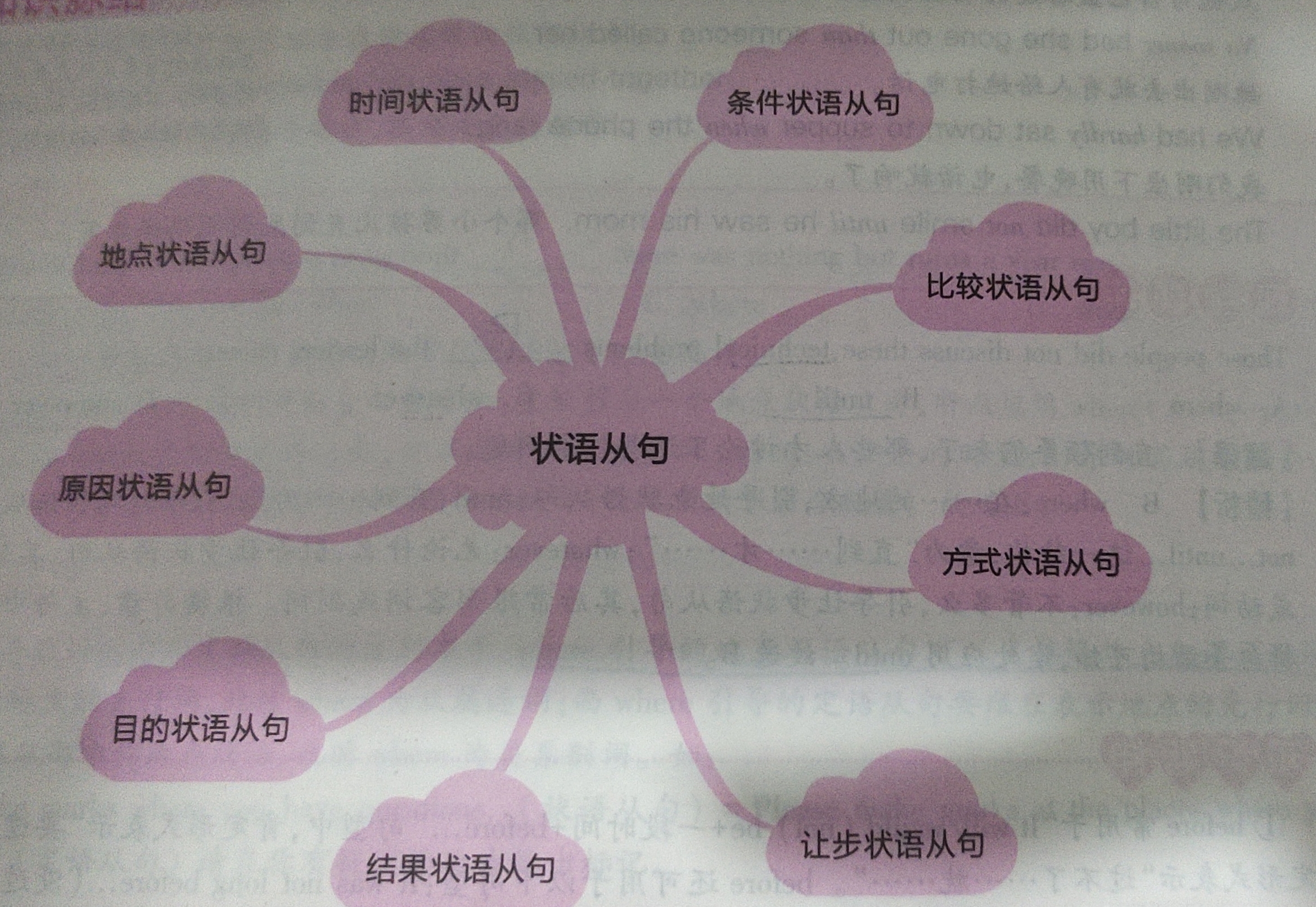30.状语从句



在复合句中充当状语的从句叫作状语从句,起副词的作用。状语从句按其功能可以分为时间、地点、原因、目的、结果、条件、比较、方式、让步九种。
状语从句在复合句中的位置比较灵活,可位于主句之前,也可位于主句之后。状语从句前置时,从句与主句之间一般用逗号隔开;后置时,从句与主句之间可以不用逗号。
1.时间状语从句
时间状语从句通常由下列连词引导:when/while(当……的时候),whenever(每当),as(当……时,随着),before(在……以前),after(在……以后),since(自……以来,从……以后),as soon as(
就……),no sooner...than.../hardly...when.../scarcely..when...(刚……就……),once(一旦,一……就……,一..……
当……时候),immediately/directly/instantly(一……就……),not...until...(直到……才……),till/until(直到……为止)。
People breathe a little slowly when they are asleep.人睡着时呼吸有点缓慢。
She comes to chat with me whenever she feels lonely.她每当感到寂寞时就来和我聊天。
I saw him as he got off the bus.
当他下公共汽车时,我看见了他。
It may be many years before the situation improves.这种状况或许要过很多年才会得到改善。
She has been very excited since she talked with her favorite star.从她与自己最喜爱的明星说过话以后,她就非常兴奋。
No sooner had she gone out than someone called her.
她刚出去就有人给她打电话。
We had hardly sat down to supper when the phone rang.我们刚坐下用晚餐,电话就响了。
The little boy did not smile until he saw his mom.那个小男孩儿直到见到他妈妈才笑。
while和when都可以引导时间状语从句,意为“当·…···的时候”,其区别在于:while引导的时间状语从句中的动词必须是延续性动词,而when引导的时间状语从句中的动词可以是短暂性动词,也可以是延续性动词。
as引导时间状语从句时,从句谓语动词通常只能是表示动作意义的动词,不能是be,have,like等表示状态或静止意义的动词。
1 before 常用于“1t will/would (not) be+一段时间+hefore..”句型中,肯定形式表示“要过……才………”否定形式表示“过不了……就……”。before还可用于以下句型:It was not long before..(没过多久就………)t was long before..(过了很久才……),It will not be long before..(过不了多久就……),It will be longbefore...(要过很久才……)。如:
It will be two hours before the meeting ends. 这场会议要过两个小时才会结束。
It was long before I knew the truth.过了很久我才知道真相。
② till/until引导时间状语从句时,若主句为肯定句,主句谓语动词必须是延续性动词,且该动词所表示的动作或状态一直延续到从句所表示的动作发生为止;若主句为否定句,主句谓语动词可以是短暂性动词,也可以是延续性动词,表示在特定时刻动作的转变。如:
He waited till/until she arrived at the cafe.他一直等到她到达咖啡馆。
I did not begin to work till/until he left.直到他离开,我才开始工作。
He did not know the truth till/until Mary told him.直到玛丽告诉他,他才知道真相。
一些表示时间的名词词组,如the moment/the minute/the instant(一……就……),the day(这天,那天)the year(这年,那年),each time/every time(每次), next time(下次),the first time(第一次)等,也可以用来引导时间状语从句,这时它们起连词的作用。此外,短语by the time(到……的时候)也可以起连词的作用.引导时间状语从句。
The moment I saw the photos, I recalled our wonderful days in school.
一看到这些照片,我就想起了我们上学时的美好日子。
The operation on my friend's father had been finished by the time she arrived at the hospital.我朋友到医院的时候,她父亲的手术已经完成了。
2.地点状语从句
地点状语从句通常由下列连词引导:where(在……的地方),wherever(在任何地方),everywhere(所有地方,各个地方),anywhere(任何……的地方)。
You should put things where you can find them again.你应该把物品放到你能再次找到它们的地方。There are still many vacant seats now. You can sit wherever you like.
现在还有很多空位。你可以坐在你喜欢的任何地方。
I always think of you everywhere we once stayed together.
在我们曾经一起待过的各个地方,我总是会想起你。
hoe引导状语从句和定语从句的区别在于:where引导的地点状语从句可以直接修饰主句谓语动词。其前没有表示地点的先行词,此时where为从属连词;而where引导的定语从句要跟在表示地点的先行词后面,且where在从句中作地点状语,此时where为关系制词。如:
Please make marks where you have questions. (状语从句)=Please make marks at the places where you have questions. (定语从句)请在你有疑问的地方做出标记
3.原因状语从句
原因状语从句通常由下列连词引导:because(因为),as(因为,由于),since(既然,由于,因为),for(由于,因为),in that(原因是,因为),now that(既然,由于),not that....but that...(不是因为……而是因为……),seeing(that)(因为,鉴于),considering(that)(鉴于,考虑到),given that(考虑到)
Because he broke the tratfic regulations,he was punished.
因为他违反了交通规则,他受到了惩罚。
As the question is very important, we will discuss it once again.由于这个问题很重要,我们将再讨论一次。 al
Since this method doesn't work, we can try another.
既然这个方法不奏效,我们可以试试另一个。
This place is an ideal site for a university in that it is far from the downtown area.
这个地方是一所大学的理想校址,因为它远离市区。
Now that all are present,let's set off.既然所有人都到了,我们就出发吧。
because引导原因状语从句时,可以在其前加上only,just,partly,simply等副词,以加强语气。
表示“因为”的连词不能与表示“所以”的连词so连用。
4 目的状语从句
目的共语只句消资由下列连词91导s that(为了,以便), in ander that(为了,以便,目的在于),lea(笔恐,免得,以免),for fear (that)(唯恐,以免),in case(以防万一,以防)。
I turned off the TV so that/in order that my son could study in a quiet environment.
我关掉了电视,以便我儿子能在一个安静的环境中学习。
He emphasized this point again and again, lest/for fear (that) she should forget.
他反复强调这一点,唯恐她忘了。
I like to keep a few envelopes in hand in case I need them sometime.
我喜欢在手头留存一些信封,以备不时之需。
为简清起见,当目的状语从句的主语与主句的主语相同时,有时可以用不定式短语或介词短语替换目的状语从句。如:
He set ut carly so that he could altend the wedding on time.=He set out early so as to attend the wedding on time. 他出发得早以便能按时参加婚礼。
He is working hand in onder that he can achieve the goals.=He is working hard in onder to achieve the goals.为了能达到目标,他正在努力工作。
He loft teo hours early for fear (that) he might miss the train. =He left two hours early for fear of missing the train. 他提前两小时离开,以免错过火车。
5.结果状语从句
结果状语从句通常由下列连词引导:so that(因此,所以),so...that...(如此……以至于……),such...that..(如此……以至于……)。
He spoke very clearly, so that everybody understood him.
他讲得很清楚,所以大家都理解他(的话)了。
She is so interesting a person that everyone likes to be with her.
她是一个如此有趣的人,以至于所有人都喜欢和她待在一起。
It was such terrible weather that we couldn't finish the work on time.
天气如此糟,以至于我们不能按时完成工作。
so that既可以引导目的状语从句,又可以引导结果状语从句,区别在于:
1引导目的状语从句时表示一种意欲或可能性,而引导结果状语从句时表示一种事实。2引导的目的状语从句中常含有can,could,may, might,would等情态动词,而引导的结果状语从句中一般没有情态动词。
③引导的目的状语从句与主向之间一般不用逗号隔开,而引导的结果状语从句与主句之间可以用逗号隔开。如:
She left early so that she could catch up with her friends. (目的)
她早就离开了,以便能赶上她的朋友们。
She left early, so that she caught up with her friends.(结果)
她离开得早,因此赶上了她的朋友们。
6.条件状语从句
条件状语从句通常由下列连词引导:f(如果,倘若,假若),unless(除非,如果不),on condition that(在……条件下,条件是), as/so long as(只要),in case(如果,假使), supposing(that)(假定,假设),providingprovided (that)(假如,如果,在……条件下)。
If you raise the idea at the meeting, I will support you.
如果你在会上提出这个想法,我将支持你。
You can't carry out the plan unless you get his permission.
你除非得到他的批准,否则不能执行这个计划。
I will agree to come on condition that she is invited to come too.
我会同意来,条件是也邀请她来。
We'll start working immediately as/so long as you accept our conditions.
只要你接受我们的条件,我们会立即开始工作。
in case引导目的状语从句和条件状语从句的区别在于:in case意为“以防万一,以防”时,引导目的状语从句,常位于主句之后,从句可用陈述语气,也可用虚拟语气,使用虚拟语气时从句谓语动词用“should+动词原形”的形式;意为“如果,假使”时,引导条件状语从句,常位于主句之前。如:
Take an umbrella with you, in case it rains/should rain. (目的)
带把伞,以防下雨。
In case John comes, please tell him to wait. (条件)
如果约翰来了,请吩咐他等一下。
7.比较状语从句
比较状语从句通常由下列连词引导:than(比),as...as...(像…… 样……),not as/so...as...(不像……一样……),the+比较级...,the+比较级...(越……,就越……)。
She is not as/so energetic as she used to be. 她不像过去那样充满活力了。
The more accurately you use the words, the more easily people can understand you.
你用词越准确,人们就能越容易理解你(的话)。
①在than,as.. 引子的比较提语从句中,常省略和主句相同的部分,只留下相比g的部分 如:
Bill is much taller than his friend (is). 比尔比他的朋友高得多。
在hn, 引手的比较获语从句中,常用助动词的某种形式、he动词的买的形式或情态动词代替与主句相同的谓语动词或动词短语。如:
He loves me more than you do. (do代替 love me)
他比你更爱我。
Jack works as hard as Jim does.(does 代替works)
杰克工作和吉姆一样努力。
8.方式状语从句
方式状语从句通常由下列连词引导:(jot)ass….(正如……一样,……也……),as if/though(解像),as(按照,照……方式),like(像……一样,好像),the way(像……那样,以……方式)。
Just as food can nourish the body, so books can enrich the mind.
正如食物能滋养身体一样,书籍也能丰富头脑。
She acts as if/though she were the owner of the villa.
她表现得好像她是这座别墅的主人。
Mary didn't see things the way her mother did.
玛丽看待事情的方式与她母亲不同。
9. 让步状语从句
让步状语从句通常由下列连词引导:as(尽管,虽然,即使)(从句用倒装结构),though(虽然,尽管即使》、ahhough(虽然,尽管,即使), while(虽然,尽管)(位于句首),even if/though(即使,虽然,尽管)whatever无论什么,不管什么),whichever(无论哪个,无论哪些),wherever(无论哪里),whenever(无论何时),whoeser(无论谁),however(无论如何,不管怎样,不管多么),no matter how/what/where/when(无论如何/什么/何处/何时),whether...or not(不管是否……)。
Great as/though our achievements are, we should not be proud.
虽然我们的成就伟大,但我们不应该骄傲。
Though/Although his parents didn't agree,he still quit the job.尽管他的父母不同意,但他还是辞职了。
We will take a trip even if/though the weather is bad.
即使天气不好,我们也要去旅行。
Whichever route you choose, it will take three hours to get there.无论你选择哪一条路线,到那里都需要三个小时。
Wherever you are,you should learn to get on with others.无论你在哪里,你都应学会与他人和睦相处。
Whoever you are,you must obey the regulations.
无论你是谁,你都必须遵守规则。
However carefully I explained, she still couldn't understand.不管我解释得多么仔细,她还是不能理解。
No matter what happens, he will not say a word.无论发生什么事,他都会守口如瓶。
no matter how, no matter what, no matter where, no matter when,however, wherever, whenever等只能引导状语从句,不能引导名词性从句,whatever,whichever,whoever既可以引导让步状语从句,又可以引导名词性从句。
Whether we can find the necessary tools or not, we'll go on with the project.
不管我们能否找到必要的工具,我们都将继续进行这项工程。
as引导让步状语从句时,从句必须倒装,即将表语、状语或谓语部分的实义动词提至句首;如果表语是带有冠词的可数名词单数,应省略冠词。though引导让步状语从句时,从句可以倒装,也可以不倒装。although引导让步状语从句时,从句不可以倒装。though,although都不能和but连用,但可与yet,still等连用。如:
Though/Although the machine is old,it is still in perfect order. =Old as/though the machine is,it is still in perfect order. 虽然这台机器老旧,但它仍然运行良好。

